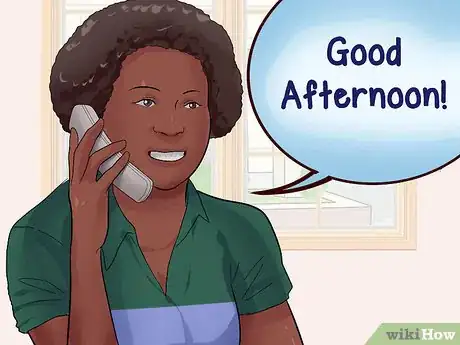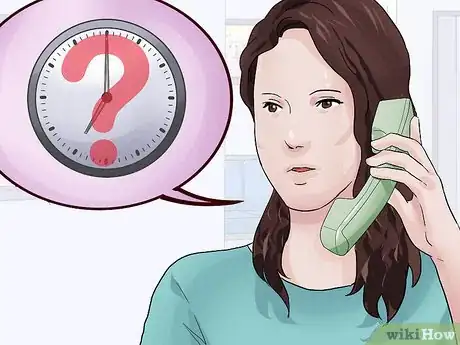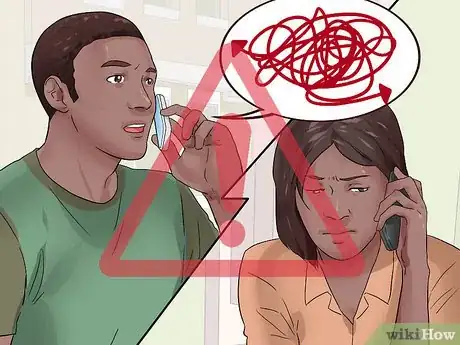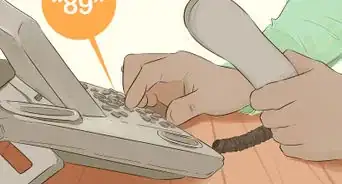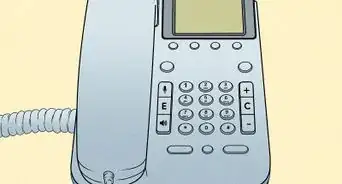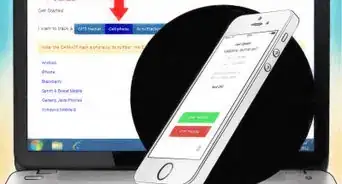This article was co-authored by Katherine Kirkinis, Ed.M., MA. Katherine Kirkinis is a Career Coach and Psychotherapist who has served as a career expert for Forbes, Medium, Best Life, and Working Mother Magazine, and as a diversity and inclusion expert for ATTN and Quartz. She specializes in working with issues of career, identity, and indecision. She has doctoral-level training in career counseling and career assessment and has worked with hundreds of clients to make career decisions through career assessments. She is pursuing a doctoral degree at The University of Albany, SUNY where her work focuses on diversity and inclusion, racism in the workplace, and racial identity. She is a published author and has been featured in academic journals as well as popular media outlets. Her research has been presented at 10+ national APA conferences since 2013.
This article has been viewed 381,700 times.
Whether you want to make a date or make a sale on the job, there are times when you have to make an important phone call. If you're not used to talking to on the phone, starting a conversation can be intimidating. The key to a successful phone call is making sure both parties feel comfortable so you can discuss the matter at hand with ease.
Steps
Planning Ahead
-
1Know what you want out of the call. Before you even pick up the phone, it’s important to identify what you want your phone call to accomplish.[1] For example, if you’re calling up someone who you’re interested in romantically, the goal may be to ask them to go out on a date. During a business call, the point may be to sell your merchandise or services. Ask yourself what you hope will come out of the conversation.[2]
- When possible, it’s good to be as specific as possible when identifying your goal. That can help you better prepare for the conversation.
- In some cases, your goal for the call may be more general. For example, you might call a business to ask about the services they offer without knowing exactly what you’re interested in. The information that you get may help you clarify exactly what it is that you need or want.
-
2Research who you will be speaking to. When you’re calling to speak to someone specific who you don’t know well, you may want to get some background info on them. That can help you get a better idea of what to expect out of the conversation. For example, if you’re talking to the CEO of a business, they’re probably very busy and won’t have much time to talk to you. If you’re calling someone who’s shy, you may need to do most of the talking.[3]
- If you’re making a business call, visit the website of the company that the person you’re calling works for. You should be able to find their title and possibly a biography that can help you get an idea for who they are.
- If you’re making a personal call, ask a friend who knows the person you’re calling what they’re like before the conversation.
Advertisement -
3Jot down a few talking points. Once you know what you want and who you’re going to be speaking with, you may feel better if you jot down some notes for the phone call. They can be points that you want to make sure to bring up or questions that you want to ask. Having a list can keep you from forgetting something important when you actually make the call.[4]
- It may help to create an outline in order of what you plan to say on the call. You’ll obviously have to adapt based on your partner’s responses, but that may help keep you on track if you’re nervous about talking on the phone.
- Think about how much time you’ll probably have on the call. It’s best to assume that you won’t have a long time, so you should focus on the most important topics that you want to discuss.
Starting a Conversation
-
1Offer a greeting and introduce yourself. You should first offer a greeting to the person who answers, such as hello or hi. These days, most people have Caller ID, but you should still introduce yourself unless the person on the end of the line greets you by name. If you’re calling someone who you know fairly well, your name may be enough. In other situations, though, you may need to provide more information so the person can identify you.[5]
- When it comes to greetings, you can also use one that's specific to the time of day, such as "Good morning, "Good afternoon, or "Good evening."
- If you’re making a business call, you should also offer the name of the company that you work for. For example, you might say, “Good morning, this is Jessica Bryant from Grace Advertising.”
- If you’re calling up someone that you’re romantically interested in, you might mention where you met. For example, you might say, “Hi, this is Mike Daniels. We met at the gym last week.”
- If you’re calling someone who you share a mutual friend with, you should provide the name of your friend. For example, you might say, “Hello, this is Alice. I’m Eric’s friend… I think he told you I’d be calling.”
- If you’re calling about a job opening, you should mention where you found out about the position. For example, you might say, “Hello, my name is Noah Reynolds. I’m calling about the job you advertised in the newspaper yesterday.”
- If you’re calling a business to ask for generic information, you don’t necessarily have to offer your name. You might just say, “Hi, I’m interested in your self-storage services.”
-
2Ask if it’s a good time to talk. If you want to have a successful phone conversation, it’s important to make sure that the person who you’re calling is just as focused on it as you are. That’s why it’s a good idea to ask if they have time to talk before you try to start the conversation. If they say that they have time to speak, you can begin your chat. If they say that they’re busy or about to head out, you should find another time to talk.[6]
- If the person you’re calling isn’t ready to talk when you call, set up another time before you hang up. You might say, “Would it be alright if I called back this afternoon? At 3 maybe?”
- If the other person wants to call you back, offer up a day and time when you’ll be available. You might say, “I’ll be available tomorrow morning. Maybe around 10?”
-
3Break the ice with small talk. If you’re calling to ask or sell something, you don’t necessarily want to go straight to what you want. That can be off-putting to the person who you’re calling. Instead, try to establish a rapport by making some brief small talk about light-hearted topics, such as the weather.[7]
- Don’t go on too long with small talk, though. The other person may start to get impatient.
- If you know the person who’re calling, personalize the banter with interests that you know they have. For example, if you’re calling someone who you know is a sports fan, you might say, “That was some Cardinals’ game last night, wasn’t it?”
- If you don’t know the person who you’re calling, keep the banter more generic. For example, you might say, “It’s been really hot lately, hasn’t it? I don’t remember it being this bad last summer.”
-
4Get to the point of the call. Once you feel like you and the other person are feeling more comfortable and relaxed, it’s time to get to the heart of the matter. Tell the person why you’re calling. Be as clear and concise as possible because you’ll sound more confident than if you’re rambling.[8]
- While you want to project confidence, make sure that you’re polite if you’re asking for something from the person you’re calling.
- If you talk too long without stopping, the other person may start to tune you out. It’s a good idea to stop and get feedback if you have quite a bit that you want to say.
- Don’t eat food or chew gum while you’re talking on the phone. The noises can give the impression that you’re not really invested in the conversation.
Setting up for the Call
-
1Find a quiet spot. When it’s time to make the call, you want to be sure that it will be as successful as possible. That means you want to create an environment that’s conducive to conversation, so locate a quiet spot to use the phone. You want to keep background noise to a minimum to avoid having to ask the other person to repeat themselves or shout to have them hear you.[9]
- The best place to make your call is an empty room with the door closed. That way, you’re guaranteed a quiet space.
- If you have to make your call in an office with open cubicles where you can hear your co-workers, you may want to time your call so the office isn’t as full. For example, you might place your call during lunch time or at the end of the day when people are heading home.
- When possible, avoid making important phones calls in public places, such as a restaurant or store. They’re usually full of distractions and too loud for a successful conversation. If you have to call someone when you’re out, try to find a quiet spot, such as the hallway outside the bathrooms at a restaurant or an empty aisle at the store.
-
2Check for a good signal. These days, many people use cell phones as their main phone. If that’s the case for you, make sure that you have a strong signal on your phone before you make your call so you know the quality will be good. Walk around until you have a signal that you’re comfortable with. If you can’t get one with your cell phone, you may want to use a landline.[10]
- The sound quality of a call on a landline is usually going to be better than on a cell phone, so if your call is very important, you may want to use a landline if possible. That’s especially true if you’re calling someone who’s older and whose hearing may not be as good.
- When you’re using a cell phone, make sure to hold it so the internal microphone will pick up your voice without any trouble. It’s best not to make important calls on speaker phone.
-
3Make sure you’re comfortable. Before you start dialing, you want to ensure that you’re ready to concentrate fully on your conversation. For example, you should check that you don’t have to go to the bathroom and that you have a beverage nearby in case you get thirsty. It’s also a good idea to have tissues on hand in case you have to sneeze during the call.
- Decide if you’ll be more comfortable sitting or standing for the call. If you’re nervous, you may find that pacing slightly while you talk can help calm you down.
Community Q&A
-
QuestionHow can I have an interesting conversation with my guy friend without being nervous?
 Community AnswerDon’t overthink the conversation before you call. Planned out conversations never go in the direction you want them to, so just go with the flow. Think of the guy or gal as your best friend; talk to them like you’ve known them all your life (maybe you have!). Don’t force conversation. Don’t be nervous; you’re more likely to mess up that way. Make the conversation feel natural.
Community AnswerDon’t overthink the conversation before you call. Planned out conversations never go in the direction you want them to, so just go with the flow. Think of the guy or gal as your best friend; talk to them like you’ve known them all your life (maybe you have!). Don’t force conversation. Don’t be nervous; you’re more likely to mess up that way. Make the conversation feel natural. -
QuestionWhat are good questions to ask over the phone?
 Community AnswerAsk her how she's doing. Ask her what she's been up to. Ask her about what she likes to do. Get her talking about her passion, but be subtle.
Community AnswerAsk her how she's doing. Ask her what she's been up to. Ask her about what she likes to do. Get her talking about her passion, but be subtle. -
QuestionCan I screech when having a phone conversation?
 Community AnswerIt's not clear why you'd want to screech on the phone, nor what benefit you think this would bring you or the listener. Since it'll likely upset the listener by being an awful sound, it is not recommended that you screech at all. If you do, expect the listener to hang up.
Community AnswerIt's not clear why you'd want to screech on the phone, nor what benefit you think this would bring you or the listener. Since it'll likely upset the listener by being an awful sound, it is not recommended that you screech at all. If you do, expect the listener to hang up.
References
- ↑ Katherine Kirkinis, Ed.M., MA. Career Coach & Psychotherapist. Expert Interview. 14 October 2020.
- ↑ http://www.fastcompany.com/3013588/dialed/8-steps-to-actually-get-good-at-phone-calls
- ↑ http://www.fastcompany.com/3013588/dialed/8-steps-to-actually-get-good-at-phone-calls
- ↑ http://www.fastcompany.com/3013588/dialed/8-steps-to-actually-get-good-at-phone-calls
- ↑ http://speakupforsuccess.com/5645/public-speaking-phone-tips/
- ↑ http://speakupforsuccess.com/5645/public-speaking-phone-tips/
- ↑ http://www.fastcompany.com/3013588/dialed/8-steps-to-actually-get-good-at-phone-calls
- ↑ http://beafreelanceblogger.com/phone-skype-confidence/
- ↑ http://speakupforsuccess.com/5645/public-speaking-phone-tips/
About This Article
The best way to start a phone conversation is to greet the other person politely and introduce yourself if you think the person doesn’t know who’s calling. You could say, for instance, “Good morning. This is Chad from Liberty Bank.” Break the ice with small talk, such as commenting on the weather or a recent sports game. Then, get to the point of the call by saying, “I’m calling to discuss...” For more advice on how to plan ahead and set up for the call, such as preparing talking points, read on!




